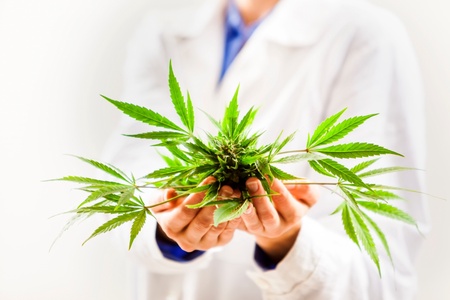Gene region could identify people who may benefit most from medical cannabis.
Researchers from the University of Aberdeen have identified parts of a gene that could open the door to treatment with medical cannabis for millions of people.
Although promising, the potential of cannabinoids in treating disease, addiction and obesity has been hampered due to the unpredictability of adverse side-effects which can include depression and psychosis. At present there is no way to predict which people will experience these side-effects, but Dr Alasdair MacKenzie and his team, including leading cannabis researcher Professor Roger Pertwee, are working towards making these predictions.
In a study published in Psychoneuroendocrinology, Dr MacKenzie and Dr Elizabeth Hay from the School of Medicine, Medical Science and Nutrition at the University, used revolutionary DNA sequencing, CRISPR technology to study specific areas of the gene that make cannabis receptors in the brain. According to their research, these previously ignored gene regions may hold the key to understanding why people respond differently to some drugs and could help inform treatments tailored to the individual.
Dr MacKenzie explains: “We found that there was a genetic switch within the cannabis receptor in humans and mice and which had remained almost unchanged for hundreds of millions of years. This switch controlled the expression of the receptor in a part of the brain that modulates mood. We found that when we disrupted this switch in mice, alcohol intake and anxiety levels were reduced, as were the effects of cannabinoids.
“This means that we are helping to establish a functional role for this switch which may help us understand how it responds to cannabinoids. Going forward, this will contribute to unlocking the potential of medicinal cannabis.”
Targeted drug therapy could dramatically increase the effectiveness of medicinal cannabis by eliminating the risk of harmful side-effects and this research has moved a step closer to that.
In a related study the team that were also able to identify a genetic change in the switch which occurred in about 20% of people. In a second paper published in Human Mutation, the team concluded that this may increase susceptibility to side effects in these individuals.
Dr MacKenzie explains: “Cannabinoids are amazing source of drug therapies however the side effects that some people suffer hampers the development of these drugs. We need to know why people respond differently to drugs? Why do some people suffer depression and psychosis when taking cannabis when others don’t? By identifying the people who could suffer from these adverse effects we could try to develop personalised medicine.”
“It is hoped that this “gene switch” based approach may accelerate the development of more effective “personalised” cannabinoid-based drug treatments to treat obesity, addiction and mood disorders more safely.”
Professor Pertwee who is an internationally recognised leader in the therapeutic potential of cannabinoids added: “By starting to look at the effects of genetic changes on the switches that turn genes on and off in specific cells and at specific times, instead of changes in the genes themselves, we can begin to understand how drug side effects arise in different patient groups and focus treatment using these drugs on those who would most benefit.”


